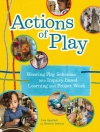<i> Why Temperament Matters: Guidance Strategies for Young Children</i> addresses early childhood behavior guidance strategies related to children’s specific temperament traits. There are nine temperament traits that influence a child’s behavior: Activity Level, Distractibility, Persistence, Adaptability, Approach/Withdrawal, Intensity, Regularity, Sensory Awareness, Mood. All nine temperament traits are grouped into three major categories of personality: easy/flexible, feisty/spirited, and slow-to-warm-up/sensitive. <br><br>This book provides specific ideas about how a child care provider can adjust the early childhood program and environment to meet the individual needs of each child’s temperament. There is a specific emphasis on children who fall into the feisty/spirited or the slow-to-warm-up/sensitive categories because they are often the ones who are expelled with challenging behaviors. <i>Why Temperament Matters</i> explains where challenging behaviors may originate in temperament and provides strategies for meeting temperament needs that prevent or lessen challenging behaviors.
Table des matières
Acknowledgments <br> Introduction <br> Chapter 1: Why Temperament Matters! <br> Chapter 2: Guiding Through Each Child’s Strengths <br> Chapter 3: Activity Level—The Need for Speed <br> Chapter 4: Distractibility—Paying Too Much Attention or No Attention at All <br> Chapter 5: Persistence—Patient or Stubborn? <br> Chapter 6: Adaptability—Resisting or Embracing Change <br> Chapter 7: Approach/Withdrawal—Quick to Join or Wait to See <br> Chapter 8: Intensity—Use Your Quiet Voice <br> Chapter 9: Regularity—How Does My Engine Run? <br> Chapter 10: Sensory Awareness—Too Hot, Too Cold, or Just Right <br> Chapter 11: Mood—Sunny or Cloudy Day <br> Chapter 12: Guidance Strategies for Temperament Types—Putting the Pieces Together!
A propos de l’auteur
Cindy Croft, M.A., is the director of the Center for Inclusive Child Care at Concordia University and has worked in the early childhood field for more than 25 years. She provides technical assistance and training to early childhood educators on adapting their physical and emotional environments to meet children’s specific behavioral needs. Cindy is the author of <i>Caring for Young Children with Special Needs</i>.









